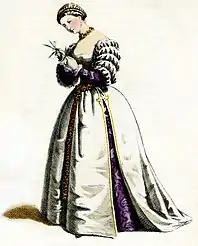
Isabella is a stock character used in commedia dell'arte, in the class of innamorata (female lover). In the commedia dell'arte, the relationship of the innamorati, or lovers, is often threatened by the vecchi (old men) characters, but they are reunited in the end.[1] In his 1929 book The Italian Comedy, Pierre Louis Duchartre writes that Isabella changed from being mainly tender and loving in the 16th century to a more flirtatious and strong-willed woman with a "lively, picturesque wit" by the end of the 17th century.[2]
Although actress Vittoria degli Amorevoli also played an inamorata named Isabella in the 16th century, the character Isabella is named in honor of the actress and writer Isabella Andreini of the commedia troupe I Gelosi, who popularized the role.[3][2] A latter Isabella was played by Françoise Biancolelli of the Biancolelli acting family.[4][2]
References
- ↑ Meagher, Jennifer (2007). "Commedia dell'arte". The Metropolitan Museum of Art. Retrieved 29 January 2020.
- 1 2 3 Duchartre, Pierre Louis (1966). The Italian Comedy. New York: Dover. pp. 272-276. ISBN 9780486216799.
- ↑ Katritzky, M. A. (2006). The Art of Commedia: A Study in the Commedia Dell'Arte 1560-1620 with Special Reference to the Visual Records. Rodopi. ISBN 978-90-420-1798-6.
- ↑ Radulescu, Domnica (2014-01-10). Women's Comedic Art as Social Revolution: Five Performers and the Lessons of Their Subversive Humor. McFarland. ISBN 978-0-7864-8858-2.